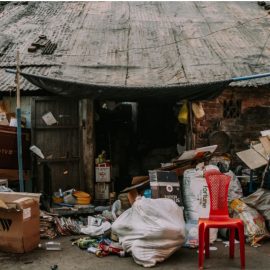

This article is an excerpt from the Shortform book guide to "Strangers In Their Own Land" by Arlie Russell Hochschild. Shortform has the world's best summaries and analyses of books you should be reading.
Like this article? Sign up for a free trial here .
What was the Bayou Corne sinkhole disaster? What happened and what did it mean for the people who lived in Bayou Corne?
In Bayou Corne, an environmental disaster lead to a sinkhole. Louisiana is staunchly pro-business and pro-energy, and residents of Bayou Corne blamed the government instead of the company at fault, Texas Brine.
Read more about the Bayou Corne sinkhole disaster and what happened.
The Bayou Corne Sinkhole Disaster
Louisiana has been beset by high-profile environmental disasters caused by a weakly regulated energy industry. One of the most devastating occurred in 2012 at a place called Bayou Corne in Assumption Parish.
There, a drilling company called Texas Brine accidentally caused the collapse of a massive cave over 5,000 feet below the bayou in the course of drilling for concentrated salt. The collapse of the cave caused oil and methane gas from the underground to rise, appearing as visible bubbles on the surface of the water. Residents reported seeing methane gas bubbles appear in puddles for weeks after the incident.
The cave’s destruction sucked in massive amounts of water, opening up a 37-acre sinkhole that destroyed trees, boats, and homes. The industrial catastrophe disrupted the geology of the local area to such an extent that small earthquakes and other seismic events rocked the community for months after the cave collapse.
Eventually, even the staunchly pro-energy industry Governor Bobby Jindal had no choice but to issue an evacuation order for Bayou Corne.
Blaming Government, Not Industry
Despite the obvious negligence, incompetence, and irresponsibility of Texas Brine, most residents of Bayou Corne did not direct their anger at the company that was directly responsible for the destruction of their community. Instead, they trained their rhetorical fire on the government.
It was the conservative paradox in action—people who’d been directly harmed by the consequences of anti-regulation politics (Texas Brine was later shown to have blithely ignored federal and state safety regulations) were lining up to denounce government as the culprit. In reality, the Bayou Corne Sinkhole disaster was a result of under-regulation, not overregulation, as well as regulatory capture, in which state agencies become dominated by industry lobbyists and representatives.
The conservative paradox leads these voters into a self-destructive feedback loop in which:
- They enthusiastically vote for politicians who promise to slash regulations on business and cut funding for agencies tasked with enforcing public safety.
- Understaffed and underfunded agencies lack the resources to properly enforce safety regulations, leading to events like the Bayou Corne Sinkhole.
- The failure of the government to prevent these disasters affirms voters and politicians in their belief that the problem lies with government—and, therefore, the only solution is to reduce its role even further by voting for more right-wing politicians.
A Community Erased
One enthusiastic, college-educated Tea Partier from Bayou Corne named Mike Schaff sees government as the source of all his community’s problems. While he disapproves of how Texas Brine handled the aftermath of the sinkhole, his emotions toward them are more based in hurt and disappointment than anger. He had genuinely believed that the company cared about the community and was surprised to see how little they did for displaced residents.
But he rationalizes their actions on the grounds that they are a profit-maximizing corporation that has to answer to shareholders. Of course they’re going to try to cut costs by evading safety regulations and fighting the payment of legal claims to residents.
But it’s the job of government officials to protect everyone, and on this score, according to Schaff, they failed miserably—only confirming his deep-seated belief in government’s essential worthlessness.
This is despite the fact that the devastating consequences of his worldview are on display all around him. For example, Schaff’s wife and grandchildren had to move away from the town, because the presence of methane gas leaks made it unsafe for them to stay. Many of his neighbors have also left under the evacuation order, decimating what was once a tight-knit and vibrant community. He is unable to even light a match in his own garage, out of concern that doing so would spark a methane explosion. His beloved community has simply been erased.

———End of Preview———
Like what you just read? Read the rest of the world's best book summary and analysis of Arlie Russell Hochschild's "Strangers In Their Own Land" at Shortform .
Here's what you'll find in our full Strangers In Their Own Land summary :
- What drives right-wing politics in America
- How a lack of empathy is increasing the partisan divide
- Why Republican politicians remain popular even if their policies don't help their voters






